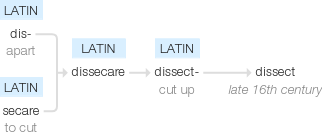Dissect
来自Big Physics
late 16th century: from Latin dissect- ‘cut up’, from the verb dissecare, from dis- ‘apart’ + secare ‘to cut’.
wiktionary
Borrowed from Latin dissectus past participle of dissecare(“to cut asunder, cut up”), from dis-(“asunder”) + secare(“to cut”); see section.
etymonline
dissect (v.)
c. 1600, "cut in pieces," from Latin dissectus, past participle of dissecare"cut in pieces," from dis- "apart" (see dis-) + secare "to cut" (from PIE root *sek- "to cut"). Or perhaps a back-formation from dissection. Specifically as "separate the distinct parts of an animal or plant for the purpose of studying its organization and functions or its morbid affections" from 1610s. Transferred sense of "examine part by part or point by point" is from 1630s. Related: Dissected; dissecting.
